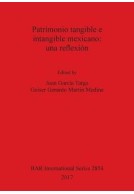Death as Archaeology of Transition (Paperback)
Thoughts and Materials
Imprint: British Archaeological Reports
Pages: 380
Illustrations: b/w illus
ISBN: 9781407313597
Published: 31st July 2015
Script Academic & Professional
Pages: 380
Illustrations: b/w illus
ISBN: 9781407313597
Published: 31st July 2015
Script Academic & Professional
You'll be £20.00 closer to your next £10.00 credit when you purchase Death as Archaeology of Transition. What's this?
+£4.99 UK Delivery or free UK delivery if order is over £40
(click here for international delivery rates)
Need a currency converter? Check XE.com for live rates
(click here for international delivery rates)
Need a currency converter? Check XE.com for live rates
This volume presents a compilation of papers from the congress held at the Centro de História de Arte e Investigaҫão Artística of the University of Évora. This second meeting concerning Transition Archaeologies was dedicated to reflecting upon the ways in which humans relate to death and in which researchers document these relationships. Nothing expresses the idea of transition better than death, from the symbolic point of view of its timeless and constant presence, and from the archaeological evidence.
In the past few years, there have been great changes in the research systems of the Iberian countries, at the precise moment when many of our teams were developing and maintaining successful connections. Along with the negative side of this situation, the fact is that the relationship between teams became necessary, and this necessity had positive outcomes. The articles in this volume written by fellow Iberian researchers, as well as French and British researchers, highlight the current situation where more open and varied views are being expressed. A wide range of topics have emerged from the data we have for Europe’s megalithic culture and interpretations are more open than the evolution theories developed in the 1980s and the 1990s. As a whole, these contributions point to the timelessness of funerary places which have survived over many generations. The spirituality of these specific topographies must have been part of the symbolic world and daily life of those who made them an expression of their place on earth through the memory of their ancestors.
Other titles in British Archaeological Reports...














